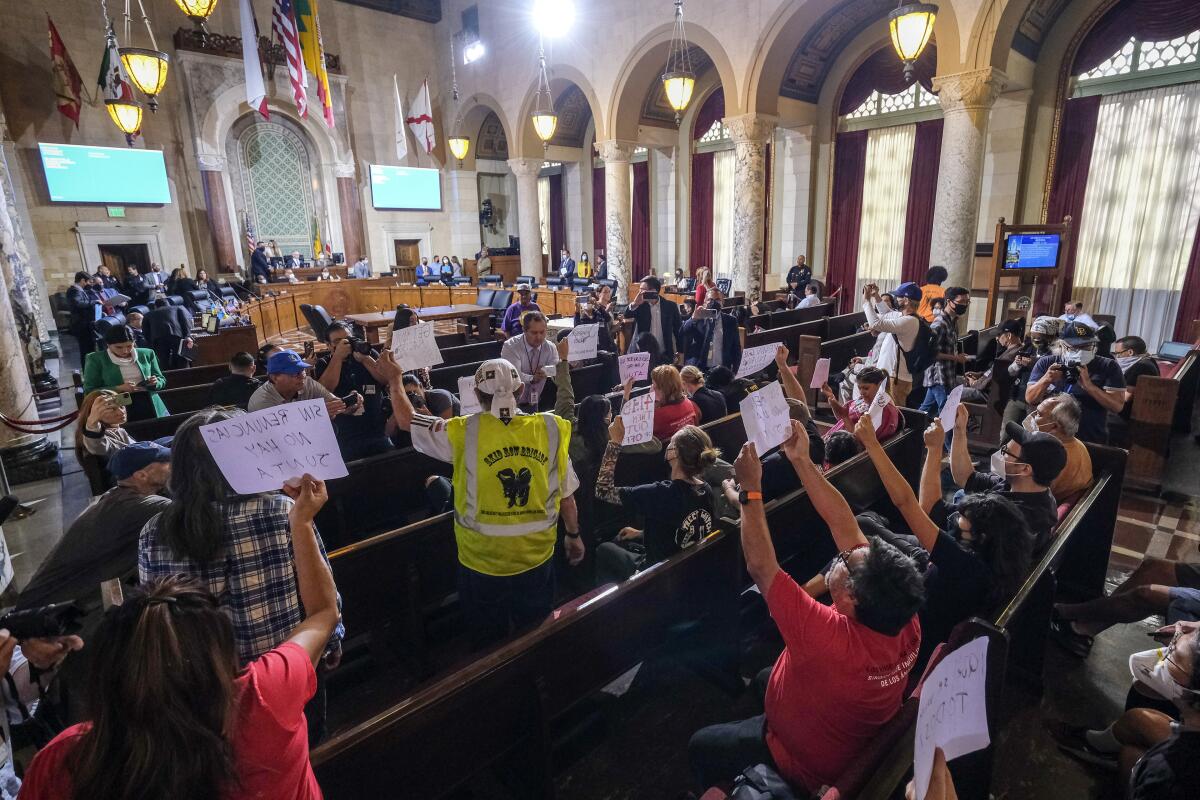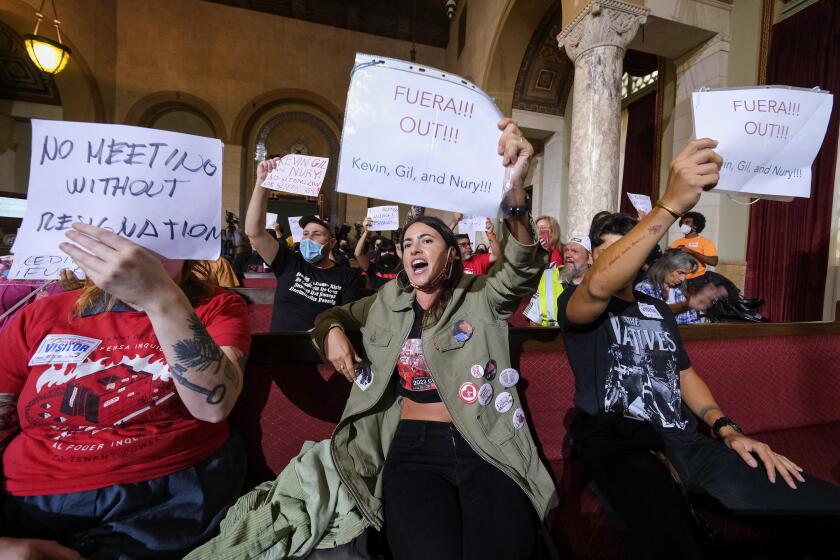How to reform L.A. City Hall to avoid future corruption and scandal

- Share via
The secretly recorded conversation from October 2021 involving three members of the Los Angeles City Council and a labor leader is yet another scandal that will further damage public trust in the city’s government.
Los Angeles has had plenty of corruption problems involving City Councilmembers centered on kickbacks, obstruction and conspiracies. The current scandal is somewhat different in its exposure of ugly racism and the use of redistricting to disempower certain racial groups and others. Still, there is a commonality with the other scandals: They are all devastating to public trust and corrosive to the governing process.
Piecemeal, limited proposals are unlikely to change the governing structure that has made such misconduct possible. That’s why reforms must be made to empower more democracy in the city. One place to start is with reforming the redistricting process, on which the governing structure rests.
The casual, anti-black racism of high-powered Latino officials forces us to face the polarized racial atmosphere of Los Angeles.
The recorded conversation was about redistricting and showed the vicious political process that often accompanies it. Truly independent redistricting commissions that take drawing district boundaries out of the hands of politicians can make a big difference in government transparency and public confidence. States that have independent commissions have found that they can limit partisan gerrymandering.
Commissions like these would be useful at the municipal level, too, helping to balance competing interests, including racial and ethnic interests, and preventing elected officials from choosing their voters and the economic assets they might covet. By charter, L.A. has a redistricting commission, but it’s not independent of the politicians who appoint them. That commission and California Common Cause, a nonpartisan watchdog group for government issues, support the idea of an independent redistricting commission for L.A.
Reforms to redistricting could be accompanied by reforms to the City Council that would strengthen local democracy. Per person, L.A. City Councilmembers represent more residents than any other city council in the country, about 265,000 people per elected member. By contrast, New York City’s 51 councilmembers each represent about 164,000 people, while Chicago’s 50 aldermen each represent about 54,000 people. A larger City Council has been recommended by the city’s redistricting commission and endorsed by City Atty. Mike Feuer and five current L.A. City Councilmembers.
Bringing elected officials closer to the people — which would happen if districts were smaller — would enhance the connection between councilmembers and their constituents and allow voters, along with potential political challengers, to better monitor the behavior of incumbents.
The effect this might have on overall corruption, however, should not be overstated. Chicago’s wards are tiny compared with L.A.’s districts, and there’s a long record of corruption there. Nevertheless, smaller districts might enhance the importance of local politics, spurring turnout and engagement in Los Angeles, which has a history of low voter turnout in city elections.
Many Latinos have worked hard to move past colorism and racism. Anyone who isn’t doing that work should not hold office.
Eliminating staggered terms for those sitting on the City Council might also force a sense of collective accountability on councilmembers if they think their reelection chances are connected to the council’s performance as a whole. Currently, only half the City Council gets elected in any one election cycle. More than 100 years ago, urban reformers promoted staggered terms to ensure institutional memory on city councils composed of part-time, volunteer officials. This outdated rule is no longer necessary.
Corruption scandals that involve bribes, conspiracy and kickbacks speak to the need to strengthen the L.A. City Ethics Commission to operate with true independence from the elected officials it monitors. The commission is proposing reforms to make it more independent, and these should be approved. Both Detroit and New Orleans created inspectors general to investigate wrongdoing in the wake of financial scandals involving their former Mayors Kwame Kilpatrick and Ray Nagin, respectively, both of whom did jail time. L.A. should do the same.
Additionally, campaign finance reform can prevent corruption among city officials. Developers are big-time players in city politics, providing funding for city campaigns. So long as elected officials need their money — even in systems like L.A.’s that allow public matching funds — the temptation to do zoning and other regulatory favors for moneyed special interests will always be there. Some cities such as Seattle are experimenting with so-called democracy vouchers in their effort to reduce the effect of big donors. These vouchers provide every voter with small amounts of money that they can use however they want to support candidates in local elections. Research indicates that this program is meeting its intended goal of diversifying the donor pool in city elections.
L.A. has seen more than its share of scandals and the complexity of the issues involved in each one makes the path forward less than clear. But it isn’t alone in dealing with municipal corruption, and the experiences of other big cities can provide lessons — and maybe even answers — on how better to foster a culture of ethical government.
Timothy B. Krebs is professor of political science at the University of New Mexico. He is the co-author of “Understanding Urban Politics: Institutions, Representation, and Policies” and founder of Krebs Research and Consulting LLC.
More to Read
A cure for the common opinion
Get thought-provoking perspectives with our weekly newsletter.
You may occasionally receive promotional content from the Los Angeles Times.








